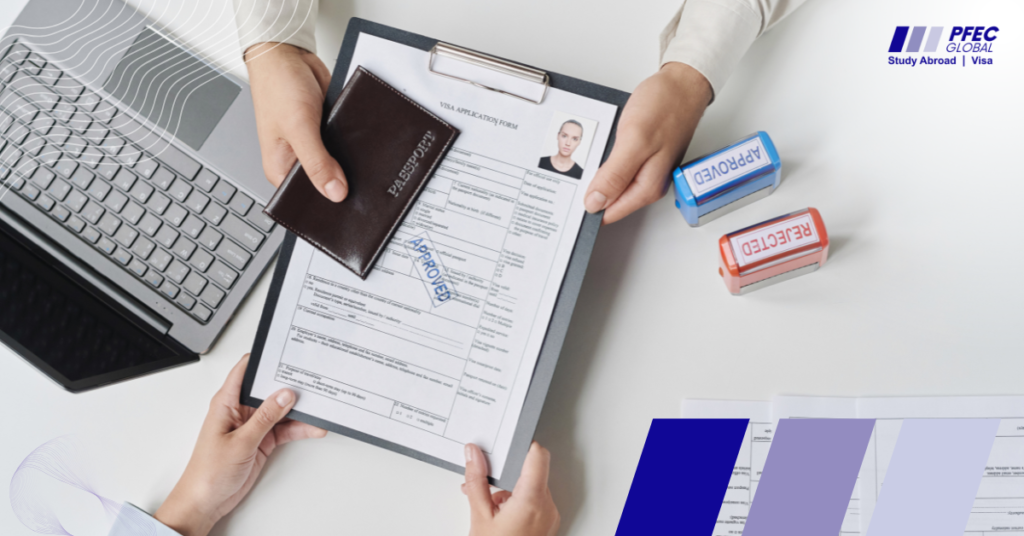How to Prepare for the UK Student Visa Application Process for Indian Students
- Priyanka Chandwani
- 8 min Read
Securing a UK student visa is a critical step in helping Indian students access world-class education and global opportunities. Early and accurate preparation prevents costly delays, strengthens visa approval chances, and ensures a smooth transition abroad. From organizing financial documents to understanding visa timelines and interview expectations, every detail matters. With the right guidance, checklists, and expert support from PFEC Global, Indian students can confidently navigate the UK visa process and turn their international education dreams into a rewarding, long-term investment.

The United Kingdom remains one of the most popular study destinations for Indian students. In 2023 alone, more than 140,000 Indian students received UK student visas, according to official UK Home Office data. This number keeps growing every year.
However, securing a UK student visa involves more than just getting an admission letter. Understanding how to prepare for the UK student visa application process is essential to avoid costly mistakes, stressful delays, and missed opportunities.
The process includes strict financial proof requirements, detailed documentation, biometric appointments, and health checks. Mistakes like insufficient funds, wrong bank statements, or delayed applications can lead to visa refusal or missing your intake altogether.
Early preparation helps Indian students manage timelines better, plan finances without panic, and secure safer accommodation options. It also gives parents time to complete important paperwork like education loans, bank sponsorship letters, or health certificates.
This guide explains each stage of the UK visa process in simple steps. It also shares insider tips that help Indian students avoid common pitfalls, increase approval chances, and start their UK education journey confidently.
Why Preparing Early for the UK Student Visa Application Really Matters
Starting your UK student visa process early is critical. Many Indian students miss intakes or spend extra money because of late preparation.
Here is why preparing early matters for Indian students:
- Visa processing usually takes 15 to 30 working days. It can take longer during peak months like June to August.
- Delay in receiving CAS letters from universities can push your application timeline.
- Booking international flights at the last minute can cost ₹30,000 to ₹60,000 more.
- On-campus accommodation fills quickly, especially for the September intake.
- Late visa approvals limit your choice of part-time jobs and delay your BRP (Biometric Residence Permit) collection.
Common Problems with Late Preparation
Delay Factor | Impact on Indian Students |
Late SOP or financial documents | CAS delays, visa rejections, missing intake |
Last-minute flight bookings | Higher travel costs, limited accommodation options |
Rushed visa application | Errors in forms, missing documents, visa refusal |
Delayed health checks | Tuberculosis test issues, especially in Tier 2 cities |
Expert Tip:
Start preparing your documents at least 3 to 4 months before your course begins. This gives enough time to correct errors, arrange funds, and get approvals without last-minute pressure.
Early planning also helps families organise finances. You need to show ₹20 to ₹25 lakhs for tuition and living costs, with funds held for 28 consecutive days as per UKVI rules.
- If you are applying for September intake, begin in April or May.
- For January intake, start your preparation by September of the previous year.
Step-by-Step Breakdown of the UK Student Visa Process
Understanding each stage of the process makes it much easier. Here is how to move through it confidently:
1. Confirm Your CAS (Confirmation of Acceptance for Studies)
- Accept your offer and request a CAS letter from your UK university.
- CAS will include a reference number and course details, needed for your visa.
- Check your CAS carefully for mistakes like spelling, passport number, or payment details.
- Timeline: Universities usually issue CAS within 3 to 10 days after deposit and document checks.
2. Prepare Your Financial Documents
You must show funds for:
- Tuition fees for the first academic year.
- Living costs for 9 months (₹1 lakh per month for London or ₹85,000 per month for other cities).
Funds can be shown through:
- Bank statements (official and stamped)
- Fixed deposit certificates (clearly showing access terms)
- Education loan approval letters
Funds must stay untouched for 28 consecutive days.
Expert Tip:
Double-check names, account details, and date ranges. Even a small error can cause visa rejection.
3. Complete the Online Application and Book Your Visa Appointment
- Fill out the UK Student Visa (Tier 4) application form online.
- Pay the visa fee (₹40,000) and Immigration Health Surcharge (IHS) (₹55,000 per year).
- Schedule your biometric appointment at a nearby VFS Global centre.
Timeline:
Start this at least six weeks before your planned travel date.
4. Submit Biometrics and Attend the Visa Appointment
- Carry originals and photocopies of your passport, CAS, financial proofs, and academic documents.
- Biometric data includes fingerprints and a photograph.
- Some students may have a short credibility interview.
Pro Tip:
Be prepared to explain your course choice, career plans, and financial support clearly and confidently.
5. Wait for Your Visa Decision
- Standard processing takes 15 to 21 working days.
- Priority processing costs an additional ₹22,000 and delivers results in 5 days.
- Super Priority service costs ₹95,000 and gives results by the next working day.
After approval, you will receive a visa vignette sticker in your passport and instructions to collect your BRP after arrival in the UK.
Common Challenges Indian Students Face in the UK Visa Process
Even well-prepared students can face challenges during the visa process. Understanding UK student visa application process benefits and challenges can help you avoid common mistakes and improve your approval chances.
Real-World Challenges Indian Students Report:
- Bank statements missing UKVI-required seals, account numbers, or holder names
- Education loan letters missing key details like disbursement amount or conditions
- Family pressure to save on priority visa services, leading to missed intake deadlines
- Fear of visa rejection among students with academic gaps, backlogs, or low scores
- Confusion about document organization, such as mixing originals with photocopies
Student Insight:
A student from Nagpur faced a visa delay because his father’s fixed deposit letter did not clearly state that the funds were withdrawable. He missed his original flight and had to pay ₹45,000 for a last-minute ticket.
How to Avoid These Problems:
- Start documentation at least three to four months before your course start date
- Use only official bank formats with verified seals and signatures
- Review all documents carefully with your PFEC counselor before submission
- Prepare for the credibility interview by understanding your academic and career story
- Organize your originals and photocopies separately to avoid confusion
Expert Tip: Preparing thoroughly protects your intake timeline, reduces stress, and strengthens your visa approval chances.
Key Documents You Will Need (and How to Get Them Right)
Incomplete or incorrect documents are one of the top reasons for UK student visa rejections. Every document must be complete, current, and properly formatted according to UKVI standards.
Essential Documents for UK Student Visa:
Document | Details | Important Notes |
Valid Passport | Must have at least one blank page | Should be valid for your course duration plus 6 months |
CAS Letter | Issued by your UK university | Verify details like name, passport number, course title, and fee payment |
Financial Proof | Bank statements, education loan, or FD letter | Must show account holder name, number, and 28-day maintenance balance |
English Test Results | IELTS, TOEFL, or PTE as accepted by university | Check specific course and visa score requirements |
Academic Transcripts and Certificates | Class 10, 12, Bachelor’s degree, or higher | Translate and notarize if not originally in English |
TB Test Certificate | Mandatory for stays over 6 months | Test must be from a UKVI-approved clinic; certificate valid for 6 months |
Passport Photograph | 45mm x 35mm, white background | No glasses, full face visible, recent photo |
BRP Collection Letter | Issued after visa approval | Needed for collecting your BRP card upon UK arrival |
Expert Tip:
Always double-check spelling of names and birth dates across all documents. Even small errors can cause unnecessary delays or rejection.
Financial Proof Requirements: What Indian Students Need to Know
Visa officers in the UK take financial documents very seriously. Understanding the 28-day rule, minimum fund requirements, and accepted proof formats is essential to avoid rejection.
The 28-Day Rule:
- Funds must remain in the account for 28 consecutive days without dropping below the required amount.
- The closing balance must be dated within 31 days before the visa application submission.
- The full 28-day transaction history must be visible in your bank statement.
How Much Money You Must Show:
Expense Type | Amount Required | Notes |
Tuition Fees | As per your CAS letter (₹10–18 lakh average) | Must match university invoice |
Living Costs | ₹1,20,000 per month (London) ₹1,00,000 per month (outside London) | Calculated for 9 months |
Example:
If you plan to study in Manchester, you must show approximately ₹9 lakh for living costs plus your tuition fees in your account.
Accepted Formats for Financial Proof:
- Bank savings account statements (student’s or parent’s account)
- Fixed deposit letters that mention premature withdrawal is allowed
- Approved education loan sanction letters showing disbursement terms
Common Mistakes to Avoid:
- Using joint accounts with non-parent relatives (not accepted by UKVI)
- Missing bank stamps, signatures, or official letterheads
- Showing funds in foreign currency without clear INR conversion
- Providing incomplete 28-day history in bank statements
Expert Tip:
Combining a parent’s savings with an approved education loan often works best for middle-income families. Always ensure both documents meet UKVI format standards.
Final Advice:
Double-check all financial documents with PFEC counselors before your visa appointment to avoid last-minute errors or refusals.
Visa Interview Tips for Indian Applicants
While most UK student visa applications are decided based on documents, some students are invited for a credibility interview. This ensures you are a genuine student with clear academic intentions.
What UKVI Officers Check:
- Genuine interest in your course and university
- Clear academic and career plans after graduation
- Honest and verified funding sources
- Ability to understand and communicate in English
Common Interview Questions:
- Why did you choose this university and course?
- What are your plans after completing the course?
- How will you fund your education and living costs?
- Who is your sponsor, and what is their relationship to you?
- Where is your university located, and what subjects will you study?
How to Prepare for the Interview:
- Learn your CAS details, course structure, and university location.
- Practice answering questions out loud without memorizing scripted responses.
- Understand your funding details clearly, including sponsor names and bank sources.
- Stay honest and avoid giving unclear or guessed answers.
Expert Tip:
Do not worry about having a perfect accent. Focus on being clear, calm, and confident during your answers. UKVI officers value understanding over fluency.
Support Available:
PFEC counselors offer mock interviews to help you gain confidence and polish your responses before the actual appointment.
Planning Your UK Visa Around University Timelines
Visa success is not only about submitting documents. It also depends on smart timing. Knowing how to prepare for the UK student visa application process helps you avoid delays and protect your study plans.
Backward Planning Approach:
Milestone | Suggested Timeframe |
Course start date (September/January) | Day 0 |
Fly to the UK | 10–15 days before course start |
Visa approval | At least 3 weeks before flight |
Biometric appointment | 6–7 weeks before course start |
Complete online visa form and documents | 7–8 weeks before course start |
Start preparing financial documents | 3 months before course start |
Accept offer and pay deposit | 4–5 months before course start |
Receive CAS (Confirmation of Acceptance for Studies) | 3–4 months before course start |
Example Timeline:
If your course begins on 1st September:
- Pay your tuition deposit by April.
- Receive your CAS by May.
- Submit your visa application by early July.
- Plan your travel to the UK by mid-August.
Why Planning Early Matters:
- Visa delays can force expensive flight rebookings (₹20,000–₹50,000 extra).
- Late arrivals risk missing student orientation or course registrations.
- On-campus housing and part-time job options fill up fast.
Expert Tip:
Use your Class 12 results or final semester marks as a signal to start visa preparations. Early action reduces stress and keeps all options open.
Planning your UK visa steps alongside your university timeline gives you the best start to your international education journey.
Mistakes to Avoid During the UK Visa Application Process
The UK student visa process is very strict. Even one small mistake can cause major delays or rejection. Avoiding these errors is key to success.
Common High-Impact Mistakes:
- Names do not match across passport, CAS letter, and bank statements.
- Incorrect IHS (Immigration Health Surcharge) payment for a shorter course length.
- TB test taken at a non-approved clinic or taken too early.
- Bank statement missing the 28-day history, stamp, or signature.
- Loan sanction letter missing clear disbursement conditions.
- Using funds from a joint account with a non-parent relative.
- Missing visa fee payment or uploading wrong document formats.
- Delaying CAS request after paying deposit, reducing prep time.
- Typing errors in passport number or course details in the online form.
Quick Checklist to Stay On Track:
- Name and date match exactly across all documents
2.Bank proof meets the 28-day rule with clear seals and official format
3. TB test certificate from a UKVI-approved clinic, not older than 6 months
4.Correct IHS payment based on total course duration
5.CAS letter details checked carefully for errors
6.All documents scanned clearly and uploaded in PDF format
7.Visa appointment booked at least 6–7 weeks before travel
8.Interview answers prepared and practiced
Expert Tip:
Treat your UK visa application like an important scholarship application. Double-check everything. PFEC counselors can help you spot small mistakes that make a big difference.
Conclusion
The UK student visa process may feel complex at first, but it becomes manageable with early planning. Every document, deadline, and detail plays an important role in your success.
Treat the entire process as a checklist to complete step by step. Start preparations early, organize all documents carefully, and seek expert guidance if you feel uncertain.
Thousands of Indian students successfully complete this process each year by staying proactive and prepared. You can do the same with confidence, focus, and the right support behind you.
FAQs
When should Indian students start preparing for the UK student visa process?
Start 3–4 months before your course begins. For September intake, begin by April or May. For January intake, start by September.
What are the biggest reasons UK student visa applications get rejected?
- Incomplete or invalid financial documents
- CAS errors or inconsistencies
- Not meeting the 28-day fund rule
- Weak or unclear credibility interview answers
How much bank balance is required for a UK student visa from India?
You must show:
- Tuition fee (as per CAS)
- ₹9–11 lakhs for 9 months of living costs (depending on city)
Do Indian students have to attend an interview for a UK student visa?
Not always. But some are asked to attend a credibility interview, especially if there are academic gaps or funding concerns.
Can I apply for my UK visa before getting my final results or CAS letter?
No. You need your CAS letter first to apply for the visa. However, you can begin preparing documents and arranging funds while waiting.


